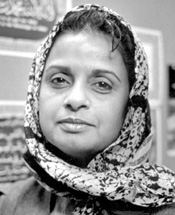From the Heart: Shamshad Sheikh Journeys to Afghanistan
FRED LEBLANC
It isn’t about religion. It has nothing to do with politics. When Sister Shamshad Sheikh boards a plane December 25 with Kabul as her eventual destination, it will be because she feels she must bear witness to the suffering of women in Afghanistan. “This is from my heart,” she says.
“I need to go see with my own eyes, especially at the refugee camps, how the women have been treated,” says Sheikh, who is now in her sixth year as the College’s Muslim chaplain. “They have suffered for being women.”
Over the past several weeks, as the nation’s attention has been focused on the war being waged against the Taliban, Sheikh has become convinced that there’s more to the story than the news media have reported. “I strongly feel that we are not getting the real news here,” she says. “I’m very concerned about the women—about all those women. What can we do to help them out? Sitting here at my desk, I don’t have much idea. Seeing is believing, to me.”
https://www.mtholyoke.edu/offices/comm/csj/113001/shamshad.shtml
A November 23 report in London’s Daily Telegraph, reprinted by the United Nations High Commission on Refugees, hints at this difference between perception and reality. “In the West, we have built up a picture of Afghan women desperate to cast off their shrouds, pull on their jeans and have a party,” writes Alice Thomson. “We have become obsessed by liberating them from the Taliban and writing about the first beauty parlor in Kabul. But what women really, really want in Afghanistan is food and medicine. Next, they want peace, not more warring factions, ambitious warlords and ethnic disputes. Then, for the countless widows, the chance to work in the fields or markets to support their families.”
According to Amnesty International, more than 1 million civilians have been killed in fighting in Afghanistan in the past twenty years, with as many as 6.2 million having become refugees. Those who suffer most are the women and children; 25 percent of all Afghan children will not live past their fifth birthday, while the literacy rate for women is barely above 4 percent, the United Nations says.
Sheikh, a native of Karachi, Pakistan, is familiar with the sad fate of Afghan women—who suffered assaults, rapes, abductions, and forced marriages in the years of the war against the Soviets, and gained a measure of security but lost their freedom under the fundamentalist regime of the Taliban. It disturbs her that to many Westerners, the image of Afghan women being forced to wear head-to-toe veils called burquas reinforces stereotypes about the subordination of women under Islam. “This has nothing to do with Islam; it’s cultural,” she says.
Her December 25 flight will take her to Karachi. From there, she will board another plane for Islamabad, and then take a bus to the border city of Peshawar. But many of the details of Sheikh’s plans, such as the hiring of guides to provide security and arrangements for crossing the Pakistan-Afghanistan border, will have to be worked out after her arrival. She does speak Urdu, the national language of India and Pakistan that has some currency in Afghanistan, and is familiar with the territory, having visited Kabul in her youth. She will carry her United States passport. To see her through the rough spots, she has her faith in God
Sheikh is aware that she faces danger and admits with concern that many people have tried to talk her out of her plans. “Everyone is discouraging me, but I have made up my mind, and I am going,” she says. “If I am to return, God will create a way for me. I am serious, and I am going,” she says. “If I can reach one woman, I will have done something. It’s important to me.”




